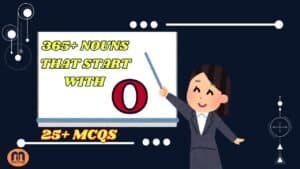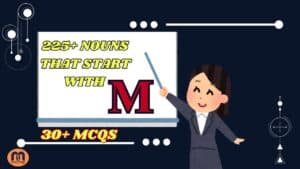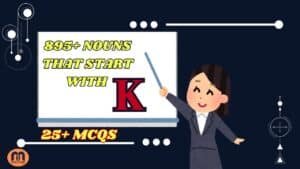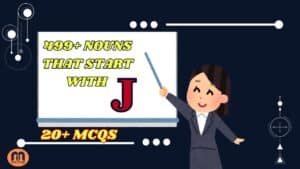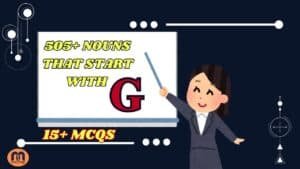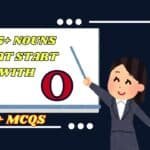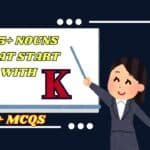Verbs That Start With B: Verbs are the heart of every sentence. They carry the action and give life to our thoughts and expressions.
Whether you’re writing, speaking, or simply seeking to improve your vocabulary, mastering a diverse range of verbs can make a significant difference. One great way to enhance your language skills is by exploring verbs that start with specific letters like the letter “B.”
In this article, we’ll take a deep dive into over 500+ verbs starting with “B.” We’ll cover their meanings, examples, and useful contexts to help you integrate them into your everyday language. Whether you’re a student, writer, or language enthusiast, this collection will serve as a valuable resource for expanding your vocabulary.
Why Verbs Matter
Before we dive into the list, let’s take a moment to reflect on why verbs are so crucial in language. Imagine telling a story without any action just descriptions or static details. Sounds boring, right? Verbs are what bring stories to life, propel conversations forward, and allow us to express complex ideas clearly.
Verbs help us:
- Communicate actions: Whether we’re taking steps to accomplish something or describing what others are doing.
- Express emotions: Verbs like “cry,” “laugh,” and “scream” convey deep emotional states.
- Indicate states of being: Words like “exist,” “seem,” and “appear” describe our condition or experience.
Now, let’s explore some action-packed verbs that start with the letter “B.”
A Wealth of “B” Verbs
Verbs beginning with “B” can describe a wide array of actions, feelings, and states of being. Here are some categorized examples to give you a clear sense of how diverse and versatile these verbs can be.
Verbs That Convey Movement
Movement verbs describe physical actions involving change in location, posture, or motion. These verbs are essential in storytelling, giving readers or listeners a clear sense of action and direction. They help us capture everything from running to shifting position.
- Balance
- Bounce
- Bend
- Bolt
- Blow
- Brisk
- Breeze
- Bounce
- Bridle
- Bumble
- Bend
- Blow
- Brag
- Blow
- Broach
- Brace
- Blaze
- Balk
- Bluster
- Broil
- Burn
- Burst
- Budge
- Blink
- Bail
- Brush
- Beat
- Bounce
- Bend
- Bump
- Blow
- Bolt
- Bray
- Bow
- Bash
- Baste
- Brisk
- Buckle
- Bulge
- Balance
- Bark
- Boil
- Bluff
- Block
- Blockade
- Blunt
- Breach
- Bathe
- Blend
- Blaze
- Batter
- Bleed
Verbs That Relate to Speech or Communication
Verbs relating to speech or communication help convey the act of sharing ideas, expressing emotions, or initiating dialogue. These verbs make conversation vivid and can be used in a wide array of contexts, from formal presentations to casual chats.
- Blurt
- Banter
- Broadcast
- Bellow
- Boast
- Brag
- Bicker
- Blame
- Broach
- Babble
- Bash
- Beseech
- Bewail
- Bawl
- Barter
- Bluster
- Blow
- Browbeat
- Bargain
- Blab
- Bellow
- Blow
- Bid
- Bridle
- Blame
- Buzz
- Blurt
- Bray
- Bolt
- Bellow
- Bet
- Bait
- Boggle
- Bark
- Bang
- Beg
- Bore
- Bawl
- Babble
- Balance
- Balk
- Brag
- Banish
- Banish
- Bum
- Bridle
- Bump
- Bill
- Bump
- Bind
- Barge
Verbs That Express Intensity or Change
Intensive or change-related verbs are dynamic and suggest transformation, whether it’s a physical, emotional, or mental shift. These verbs help narrate moments of growth, deterioration, or intensity.
- Blaze
- Broil
- Burn
- Brew
- Burst
- Befoul
- Blow
- Boil
- Baffle
- Blur
- Brave
- Bait
- Batter
- Breach
- Balk
- Blend
- Blight
- Bleach
- Blow
- Bleed
- Blister
- Bust
- Break
- Blunder
- Binge
- Bully
- Build
- Bend
- Bolt
- Bluff
- Baffle
- Blow
- Burst
- Balance
- Bore
- Brim
- Blast
- Betray
- Blister
- Boom
- Burn
- Bash
- Break
- Brighten
- Breathe
- Backfire
- Blow
- Barrage
- Battle
Verbs for Creating or Producing
Creating or producing verbs focus on bringing something into existence or generating something new. These verbs are often used in artistic, industrial, or developmental contexts. Whether it’s crafting an object or bringing ideas to life, these verbs help define creation.
- Build
- Breed
- Bake
- Brew
- Button
- Blaze
- Break
- Balance
- Belt
- Bind
- Bask
- Bend
- Bolt
- Brew
- Blare
- Blow
- Blend
- Bridging
- Bribe
- Bandage
- Barge
- Boost
- Buckle
- Bore
- Balance
- Brew
- Bolster
- Borrow
- Befriend
- Bolster
- Breathe
- Burst
- Bend
- Bury
- Beseech
- Begin
- Bandage
- Break
- Brag
- Blunt
- Bait
- Bolt
- Bash
- Brew
- Blare
- Bind
- Breach
- Batter
- Bail
- Breathe
Verbs Indicating Causality or Influence
Causality or influence verbs help describe actions that lead to an effect, change, or influence on others. These verbs show the dynamics of power, persuasion, and impact on situations or people.
- Bend
- Bribe
- Balk
- Bait
- Breach
- Blunt
- Boast
- Bolster
- Budge
- Bark
- Bribe
- Blame
- Bluff
- Batter
- Burst
- Blow
- Break
- Bolster
- Blame
- Bully
- Ban
- Blow
- Bore
- Baffle
- Bend
- Bait
- Bait
- Beg
- Bum
- Bind
- Baffle
- Balance
- Break
- Bend
- Blame
- Bark
- Bluff
- Broach
- Bray
- Benevolent
- Bait
- Barge
- Browbeat
- Baffle
- Bramble
- Bully
- Burn
- Boil
- Bash
B-Verbs in Motion
These verbs express physical actions involving movement, change, or travel. They can describe anything from a small shift to a large-scale movement. Whether it’s a casual walk or a dramatic leap, these verbs bring motion to life.
- Balance
- Bounce
- Bend
- Bolt
- Blow
- Breeze
- Bum
- Balk
- Barge
- Blunder
- Blush
- Brisk
- Bounce
- Barge
- Bump
- Bribe
- Breathe
- Blare
- Blow
- Bumble
- Bash
- Boil
- Blow
- Bridle
- Bend
- Bray
- Balk
- Bow
- Balance
- Bully
- Brat
- Beat
- Breeze
- Blast
- Barge
- Bolster
- Breathe
- Blink
- Blend
- Blot
- Bounce
- Blaze
- Baffle
- Bolt
- Bask
- Blurt
- Bramble
- Bend
Powerful Communication Verbs
These verbs focus on speaking, influencing, and interacting with others through words. Whether it’s persuading, gossiping, or shouting, these verbs capture the essence of communication. They are perfect for expressing intent and engagement.
- Blurt
- Banter
- Broadcast
- Bellow
- Boast
- Brag
- Bicker
- Blame
- Brag
- Bark
- Barter
- Bluster
- Buzz
- Beseech
- Blab
- Babble
- Blow
- Bully
- Browbeat
- Beg
- Bait
- Boil
- Bid
- Bray
- Bore
- Baffle
- Bridle
- Blurt
- Baffle
- Barter
- Blow
- Banish
- Browbeat
- Brag
- Bawl
- Betray
- Bungle
- Bluff
- Binge
- Blare
- Blow
- Babble
- Bluster
- Bail
- Bore
- Benevolent
- Buzz
- Bargain
Intense Action Verbs
These verbs convey strong feelings or high-energy actions. From setting things on fire to enduring hardship, they describe moments of intensity, conflict, or transformation. Perfect for building drama and excitement in any context.
- Blaze
- Boil
- Blow
- Breach
- Blurt
- Bend
- Blow
- Bluff
- Brew
- Betray
- Bolt
- Batter
- Burst
- Blister
- Bribe
- Bask
- Bungle
- Bludgeon
- Bore
- Bawl
- Brim
- Bellow
- Breach
- Batter
- Brew
- Break
- Blunt
- Blaze
- Blow
- Bend
- Blow
- Brag
- Breach
- Bumble
- Blast
- Burn
- Blow
- Bark
- Bolt
- Boom
- Brawl
- Bully
- Binge
- Bust
- Break
- Bash
- Bluff
- Bash
- Batter
- Blaze
- Burn
Creative Verbs to Build
These verbs focus on the creation, building, or production of something. They are perfect for artistic, developmental, or constructive contexts, whether you’re creating a masterpiece, a product, or an idea. They bring your creative thoughts to life.
- Build
- Breed
- Bake
- Brew
- Button
- Blaze
- Bolster
- Bend
- Brew
- Blend
- Bolt
- Bridle
- Bask
- Break
- Bolster
- Brew
- Blare
- Bind
- Build
- Breach
- Balance
- Bore
- Bargain
- Bait
- Boost
- Bribe
- Brace
- Breathe
- Breathe
- Boost
- Barge
- Blow
- Bore
- Buckle
- Burn
- Bask
- Befriend
- Bolt
- Brew
- Brave
- Blunt
- Blow
- Braise
- Brew
- Breed
- Blend
- Bask
- Bribe
- Balance
Verbs of Influence
These verbs describe the ability to affect, alter, or influence something or someone. Whether through power, persuasion, or effect, they show how actions lead to results. Ideal for persuasive writing and persuasive speech.
- Bribe
- Bait
- Balk
- Bluff
- Batter
- Blame
- Bolster
- Bend
- Bask
- Bully
- Blame
- Blow
- Bluster
- Browbeat
- Betray
- Baffle
- Blunt
- Barge
- Bore
- Beg
- Balk
- Bully
- Barter
- Bribe
- Blow
- Bluff
- Blaze
- Bend
- Budge
- Bust
- Betray
- Blush
- Bask
- Bait
- Bore
- Bellow
- Boom
- Beat
- Bend
- Bluff
- Blow
- Boost
- Brew
- Blare
- Brawl
- Banish
- Bully
- Breach
Dynamic Verbs in Action
These verbs describe a range of actions that propel a story, conversation, or situation forward. From high-speed movement to subtle changes, they convey a sense of ongoing energy and transformation. Perfect for keeping your language vibrant and engaging.
- Bounce
- Blow
- Bend
- Bask
- Bum
- Bolt
- Bark
- Blurt
- Boil
- Bully
- Brisk
- Bend
- Blaze
- Bluff
- Betray
- Breathe
- Bargain
- Barge
- Break
- Blow
- Blurt
- Bask
- Breach
- Balance
- Boom
- Bust
- Bolster
- Bait
- Bore
- Bellow
- Bellow
- Beat
- Blink
- Brisk
- Blow
- Bolt
- Brew
- Bum
- Betray
- Baffle
- Breach
- Bluster
- Bray
- Braid
- Brew
- Bend
- Blame
- Blast
Useful Adjectives That Can Accompany “B” Verbs
Pairing verbs with descriptive adjectives can further enrich your expression. Here are some adjectives that are commonly used with “B” verbs to add depth and clarity:
Adjectives for Movement
- Brisk – Active and energetic.
- Bold – Strong and daring in movement.
- Bumpy – Uneven or rough, especially in motion.
- Breezy – Light, smooth, and gentle in movement.
Adjectives for Speech or Communication
- Blunt – Direct and without subtlety.
- Boisterous – Noisy, energetic, and rowdy.
- Bitter – Harsh or resentful in tone.
- Brief – Short and concise in speech.
Adjectives for Intensity or Change
- Blazing – Very hot or intense.
- Blurry – Unclear or out of focus.
- Brilliant – Exceptional in intensity or brightness.
- Brash – Self-assertive in a rude or harsh manner.
Adjectives for Influence or Emotion
- Benevolent – Showing kindness or goodwill.
- Brave – Courageous in the face of danger or fear.
- Bitter – Showing resentment or harshness.
- Blissful – Filled with joy or happiness.
Practical Tips for Using “B” Verbs Effectively
Now that you have a deeper understanding of verbs starting with “B,” let’s look at some practical tips for incorporating them into your daily vocabulary.
1. Use Them in Context
When you learn a new verb, try using it in a sentence to ensure you understand how it fits. For example, after learning the verb “bounce,” try constructing a sentence like, “The ball bounced across the court.”
2. Keep a List
A great way to remember new verbs is by keeping a personal list in a notebook or digital note. Over time, add examples or sentences where you’ve used these verbs.
3. Pair with Adjectives
Make your sentences even more vivid by pairing these verbs with adjectives. For instance, instead of simply saying “She laughed,” try “She laughed joyously,” or instead of “He ran,” try “He sprinted briskly.”
4. Read and Listen Actively
Pay attention to how writers, journalists, or speakers use “B” verbs in their communication. Reading articles, watching shows, or listening to podcasts are great ways to see these verbs used in context.
Conclusion: Embrace the Power of Verbs
Verbs are the powerhouse of language, transforming sentences into lively, meaningful expressions. By expanding your vocabulary to include a variety of verbs starting with “B,” you open up a world of linguistic possibilities.
Whether you’re writing creatively, crafting professional documents, or simply engaging in daily conversation, mastering these verbs will help you communicate more effectively and express yourself with greater nuance.
Take the time to explore, practice, and incorporate these verbs into your routine. The more you use them, the more natural they’ll become in your language arsenal.
So, the next time you’re looking to make your speech or writing more dynamic, turn to this collection of “B” verbs and get creative!
MCQs: Verbs That Start With B
1. Which of the following verbs is associated with physical movement or action?
a) Bribe
b) Build
c) Breathe
d) Balance
Answer:
d) Balance
2. Which verb describes the action of speaking or communicating forcefully?
a) Babble
b) Bellow
c) Build
d) Bribe
Answer:
b) Bellow
3. Which of the following verbs indicates an intense or dramatic change?
a) Braid
b) Blame
c) Boil
d) Breathe
Answer:
c) Boil
4. What verb from the list best describes creating or developing something?
a) Breathe
b) Bribe
c) Build
d) Blare
Answer:
c) Build
5. Which of these verbs implies the act of influencing or persuading someone?
a) Baffle
b) Break
c) Bribe
d) Breathe
Answer:
c) Bribe
6. Which verb suggests an ongoing, energetic action?
a) Blink
b) Breathe
c) Barge
d) Balance
Answer:
b) Breathe
7. Which of the following verbs best describes a high-energy action or physical motion?
a) Baffle
b) Bribe
c) Bounce
d) Breathe
Answer:
c) Bounce
8. Which verb is used to describe an action that causes a major change or transformation?
a) Burn
b) Blush
c) Blow
d) Boil
Answer:
a) Burn
9. Which of the following verbs is best suited for a situation involving persuasive communication?
a) Babble
b) Banter
c) Bait
d) Bellow
Answer:
b) Banter
10. Which of the following verbs is commonly used when talking about creation or crafting something?
a) Boil
b) Build
c) Brawl
d) Blink
Answer:
b) Build
11. Which verb indicates the act of creating a powerful effect or lasting influence?
a) Bluster
b) Blame
c) Boil
d) Boost
Answer:
d) Boost
12. Which of the following verbs is related to influencing or manipulating someone?
a) Blush
b) Breathe
c) Bait
d) Break
Answer:
c) Bait
13. Which verb would you use to describe an intense burst of energy or sudden movement?
a) Breathe
b) Break
c) Blame
d) Blast
Answer:
d) Blast
14. Which verb refers to the action of urging or forcing something forward?
a) Bludgeon
b) Break
c) Balance
d) Brisk
Answer:
b) Break
15. Which verb describes a movement with sudden force?
a) Bribe
b) Boil
c) Blast
d) Barge
Answer:
c) Blast
16. Which verb would best describe a casual or light movement?
a) Barge
b) Blame
c) Breathe
d) Bump
Answer:
d) Bump
17. Which of the following verbs best describes creating something new or innovative?
a) Build
b) Beat
c) Blame
d) Blare
Answer:
a) Build
18. Which verb is commonly used to describe a conflict or aggressive interaction?
a) Brawl
b) Boost
c) Breathe
d) Blare
Answer:
a) Brawl
19. Which verb means to forcefully move something or someone?
a) Bend
b) Brag
c) Bash
d) Break
Answer:
c) Bash
20. Which verb refers to speaking or saying something suddenly without thinking?
a) Brag
b) Blurt
c) Bounce
d) Braid
Answer:
b) Blurt
21. Which of the following verbs is related to creating something through physical activity?
a) Build
b) Banter
c) Breathe
d) Boil
Answer:
a) Build
22. Which verb is most closely associated with causing or experiencing rapid action?
a) Breathe
b) Blink
c) Burst
d) Build
Answer:
c) Burst
23. Which verb describes an action that implies creating a strong effect or lasting impact?
a) Blunt
b) Breathe
c) Bait
d) Bolt
Answer:
b) Breathe
24. Which of the following verbs means to exchange something, typically in a persuasive manner?
a) Bargain
b) Blame
c) Bluster
d) Bait
Answer:
a) Bargain
25. Which verb describes an action that can imply exertion or struggle?
a) Breathe
b) Battle
c) Blink
d) Beat
Answer:
b) Battle
26. Which of the following verbs best describes a calm, composed action?
a) Blurt
b) Breathe
c) Brawl
d) Break
Answer:
b) Breathe
27. Which of the following verbs indicates creating an effect with force?
a) Boil
b) Blunt
c) Beat
d) Bolster
Answer:
c) Beat
28. Which verb would be used when describing a powerful or intense movement?
a) Breathe
b) Bluster
c) Barge
d) Blame
Answer:
c) Barge
29. Which verb best conveys the act of forcefully convincing someone or something?
a) Bait
b) Brawl
c) Bribe
d) Build
Answer:
c) Bribe
30. Which verb describes the action of bringing an effect to completion or conclusion?
a) Blare
b) Boil
c) Balance
d) Blunt
Answer:
a) Blare
Read more knowledgeable blogs on Entry Mags


